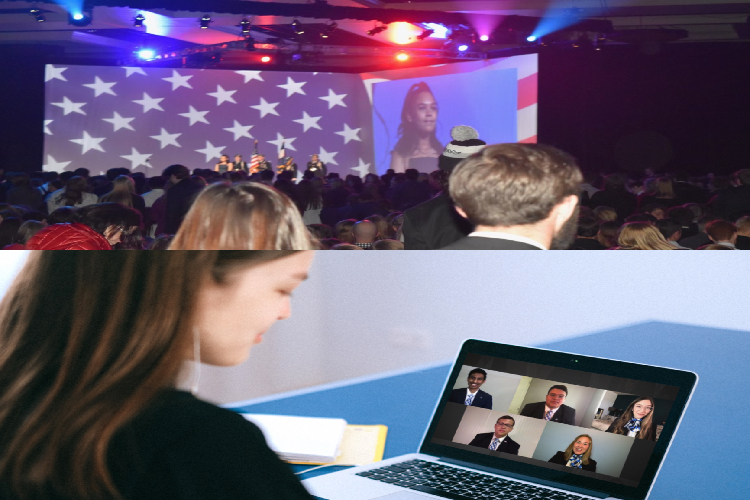
DECA moves from a lively in person experience to virtual conferences. photo by Connor Duris (top) and decadirect.org (bottom). Photo credit(bottom) decadirect.org
TJ students are preparing for virtual competitions that have become this year’s reality due to COVID-19.
DECA (Distributive Education Clubs of America) is a career and technical organization that “prepares emerging leaders and entrepreneurs for careers in marketing, finance, hospitality, and management.” This is accomplished through competitions at the district, state, and international levels. Students trade casual attire for slacks, button-downs, and blazers for a finishing touch, as they would normally stroll onto the Johnson and Wales campus to compete in person, ready for business. Coronavirus has transferred this experience online for the foreseeable future.
“What I get out of districts are the human interactions that [prepare you] for the real world,” said Zoey Gonzales, a junior at TJ who qualified for state last year. These interactions happen through role plays, where students are presented with scenarios to resolve according to their event. They’re usually given two scenarios, but this year there’s only one that’ll be distributed to students on November 16th. Preparation time has extended from ten minutes to two days, which has prompted a spike in competition because there is time for research. Setting competitors apart comes down to the execution of their performances, which will be different through a screen.
In the virtual world, the new normal involves asking for meeting codes and deciding whether or not to turn cameras on. Connecting with people has been halted, which is not ideal in the business world where communicating with others is major in determining success. In order to maintain this environment, students usually deliver their solutions to a judge who also has a professional role in the situation. Eye contact and body language are encouraged to express students’ ideas, which unfortunately can’t be reciprocated this year. Instead, role play videos are expected to be uploaded before 9 a.m. on November 18th. This serves as a disadvantage for Alice Larm, a senior at TJ and the district three representative for Colorado DECA, who competes in professional selling, which is essentially a sales pitch. She stated, “For my event, I really wish they did a zoom [call] because it’s such an interactive event.” Although this connection is missing, Larm recognized figuring out logistics for these calls would’ve been challenging. These role plays are a major part of DECA for how memorable they are in person, which has unfortunately been temporarily taken away.
Even though role plays carry this distinguishable weight for competitors, they don’t carry the sole weight of scores. Accessing competition on laptops is nothing new for testing that encompasses the other part of the DECA competition. The 100 multiple choice questions are simply transferred from the classroom to a home setting while continuing to apply to specific events. These will be done the week before role plays. With these tests and role plays submitted by the 18th, judges will score videos the rest of the week. TJ’s very own DECA Advisor, Matt Nicolo, is coordinating and training judges at the district level. He expressed, “In general, this is causing a lot more stress than usual.” Students aren’t the only ones impacted by this virtual shift, given that the DECA team is hard at work to accommodate competition. This work goes all the way to the live awards ceremony for state qualifiers on November 30th. Competition at the state level is annually hosted at The Broadmoor, in Colorado Springs, which has now been exchanged for more views of laptop screens.
This stay at Colorado’s renowned resort served as motivation for students to qualify for state, as there is a noticeable influence from lower participation numbers for districts this year. For people who are still competing, such as Larm, she reflected “the best part of districts is anxiously waiting for the announcer to call your name.” This virtual environment ultimately does not provide the same satisfaction of an in person competition. With DECA’s highlight on students’ futures, these virtual business communications are simply an insight.
Coronavirus disrupted the flow of businesses and introduced new measures to take. These challenging times are representative of how businesses are now accustomed to using the virtual world to their advantage. DECA made sure to maintain the same attitude of adapting and overcoming. Although competing online is negative in itself, Nicolo made sure to provide light for the DECA community. “DECA is trying to maintain normalcy in a very abnormal time and competition allows our students to use their creative skills to demonstrate their knowledge in a given role.”